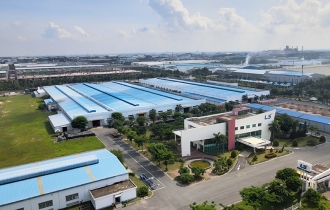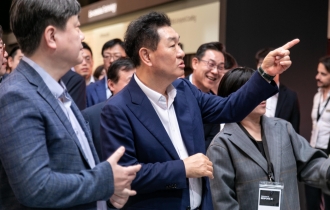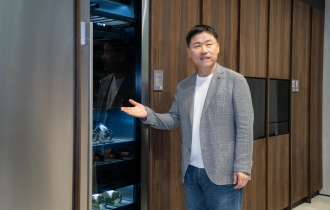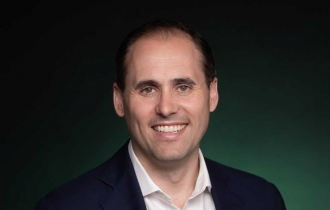[INTERVIEW] Nexon eyes future game innovation in ‘crazy experiments’
[THE INVESTOR] Nexon will continue to commit to developing new digital games that push the boundaries of established game genres despite the risks, as the company sees innovation as an essential component of its future competitiveness, its chief executive said on April 25.
“We’re doing a lot of experimentation with new games that are pushing current genres or creating entirely new genres outside of Korea,” Nexon CEO Owen Mahoney said during an interview with the local press at this year’s Nexon Developers Conference in South Korea.
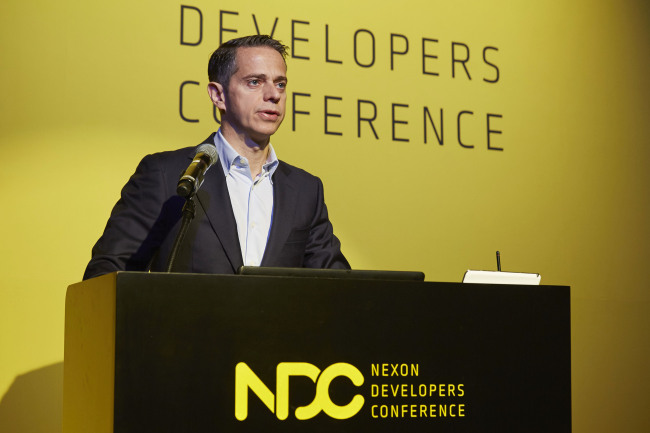
Nexon CEO Owen Mahoney delivers a keynote speech at the Nexon Developers Conference 2017 in Pangyo, Gyeonggi Province. Nexon Korea.
Such efforts are being spearheaded by Tokyo-listed Nexon’s international offices in Japan and the US, which have partnered with promising game development studios in the countries to develop creative, appealing games with new offerings.
One example is Nexon America’s partnership with US-based video game development studio Boss Key Productions. The two are co-developing a new game called “LawBreakers” -- a 3-D arena shooting game set in a world where the laws of gravity have been broken.
“The intense action of an arena shooter becomes 3-D. You can use gravity wells to come out at people from different angles. And we think that’s an interesting idea,” Mahoney said, adding that the studio is trying hard to push the boundaries of first-person shooter games.
Going beyond its strengths in action role-playing games led by hits such as “Dungeon & Fighter Online,” “Heroes of Incredible Tales” and “Dominations,” Nexon has also been experimenting with nontraditional game genres in the past year.
On the mobile front, the gaming giant recently introduced a 3-D puzzle adventure game called “After the End: Forsaken Destiny” as well as “Evil Factory,” a retro arcade mobile game -- both games that are uncharacteristic of Nexon.
“Our goal was to push ourselves to do something different than we normally do, to learn from the process and to see what comes of our efforts. And we have much bigger experiments in the works to launch in 2017,” Mahoney said during his keynote speech at the NDC 2017.
Nexon’s direction follows a broader trend in the global gaming sector toward adventurous innovation, the Nexon executive said, citing examples including Blizzard’s “Overwatch,” which innovated in an established genre, and Niantic’s “Pokemon Go” that pioneered a new genre of augmented reality mobile games.
“Over the years, most of the biggest and most sustainable hits in the industry have come from crazy experiments. The problem is experimentation and innovation are hard. They are risky,” said the Nexon CEO.
“But over time, experimentation in video games pays off. It moves the industry and the world forward. That’s why the most successful innovators in technology and in the arts say that if you’re not failing at least 20 percent of the time, you’re probably not pushing hard enough,” he said.
Mahoney, 50, is an avid gamer and a businessman with decades of experience in the global gaming industry. Prior to joining Nexon Japan, he was a senior vice president at US-based video games giant Electronic Arts and former software firms PointCast and FileMaker.
Having witnessed the game industry’s growth and setbacks, the Nexon CEO also shared insights on how cutting-edge technologies, like artificial intelligence, could impact the nature of game development.
While noting that it’s “way too early” to speculate on the potential changes that AI-driven automation may bring to the craft of game making, Mahoney predicted that AI could replace the repetitive and time-consuming components of the game development process very soon.
“In the near future, I can see AI assisting game makers in doing the more mundane work that is very time consuming in game development and game operations,” Mahoney said.
When building a new game, each design change made by a developer has myriad implications in the game. For instance, a game designer who decides to build a virtual wall higher has to individually test the taller wall’s impact on the characters and game play.
It is repetitive processes like these that can be automated via AI programs, Mahoney said, adding that such forms of automation could help raise a game company’s development productivity.
At the same time, Mahoney criticized companies that pressure their developers to finish building a game within a set timeframe, causing them to overwork and feel they are being exploited.
“Where game companies get themselves in trouble is by trying to commit to a day and then expecting the employees to overwork to get there. But I don’t believe it’s sustainable for employees to be in that position and it’s certainly not good for creativity,” said the 50-year-old Nexon executive.
Nexon was founded in Seoul in 1994 by Kim Jung-ju, now the chairman of the firm’s holding company NXC Corp. Nexon moved its headquarters to Japan in 2005 and went public on the Tokyo Stock Exchange in 2011.
Nexon is considered a pioneer of the now-popular “freemium” gaming business model that makes games free to play and charges players for additional in-game items available for purchase.
By Sohn Ji-young/The Korea Herald (jys@heraldcorp.com)
EDITOR'S PICKS
- Samsung develops fastest DRAM chip optimzied for ondevice AI
- LS Eco Energy wins $30.51m supply deal to supply Denmark's Energinet
- Samsung CEO bets big on connectivity to take on Apple
- HD Hyundai signs W641b warship deal with Peru
- LG sets W1tr sales goal for built-in appliances by 2027
- LS Materials breaks ground on EV parts plant
- Beer imports from Japan more than double in Q1
- Mirae Asset Global X set for growth under new chief







